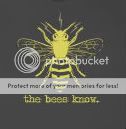- Feb 12, 2007
- 59,734
- 24,694
- 2,290
Interesting development in the quest to identify what is killing off colonies of honeybees. It's not pesticides or GMO foods. The likely culprits are a fungus and a virus.
It has been one of the great murder mysteries of the garden: what is killing off the honeybees?
Since 2006, 20 to 40 percent of the bee colonies in the United States alone have suffered colony collapse. Suspected culprits ranged from pesticides to genetically modified food.
Now, a unique partnership of military scientists and entomologists appears to have achieved a major breakthrough: identifying a new suspect, or two.
A fungus tag-teaming with a virus have apparently interacted to cause the problem, according to a paper by Army scientists in Maryland and bee experts in Montana in the online science journal PLoS One.
Exactly how that combination kills bees remains uncertain, the scientists said a subject for the next round of research. But there are solid clues: both the virus and the fungus proliferate in cool, damp weather, and both do their dirty work in the bee gut, suggesting that insect nutrition is somehow compromised.
http://www.nytimes.com/2010/10/07/science/07bees.html?_r=2&src=ISMR_AP_LO_MST_FB
It has been one of the great murder mysteries of the garden: what is killing off the honeybees?
Since 2006, 20 to 40 percent of the bee colonies in the United States alone have suffered colony collapse. Suspected culprits ranged from pesticides to genetically modified food.
Now, a unique partnership of military scientists and entomologists appears to have achieved a major breakthrough: identifying a new suspect, or two.
A fungus tag-teaming with a virus have apparently interacted to cause the problem, according to a paper by Army scientists in Maryland and bee experts in Montana in the online science journal PLoS One.
Exactly how that combination kills bees remains uncertain, the scientists said a subject for the next round of research. But there are solid clues: both the virus and the fungus proliferate in cool, damp weather, and both do their dirty work in the bee gut, suggesting that insect nutrition is somehow compromised.
http://www.nytimes.com/2010/10/07/science/07bees.html?_r=2&src=ISMR_AP_LO_MST_FB
